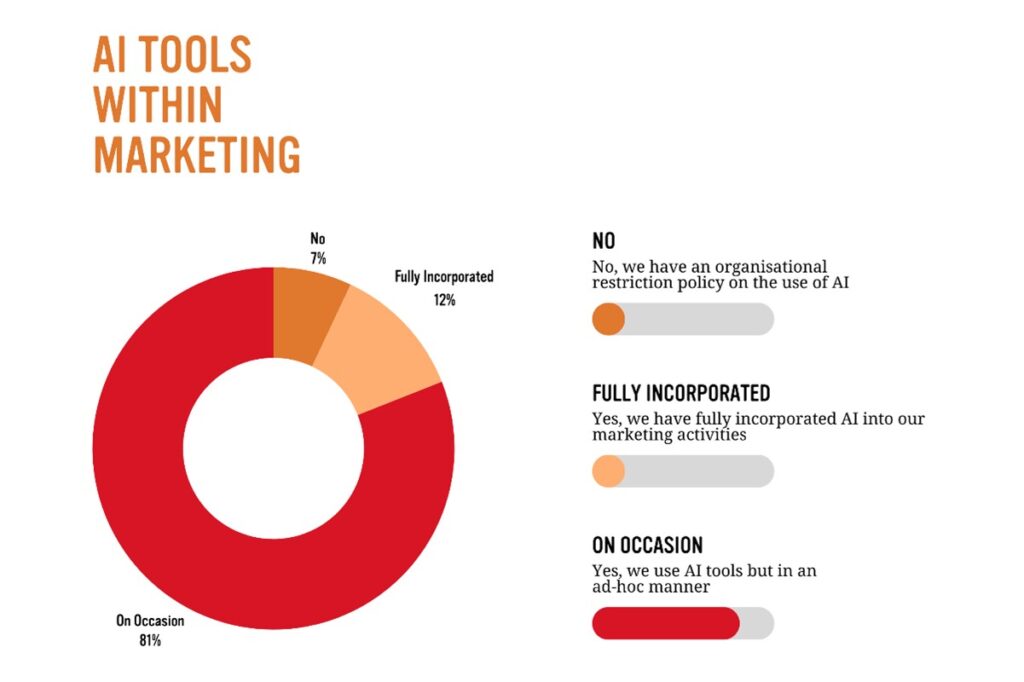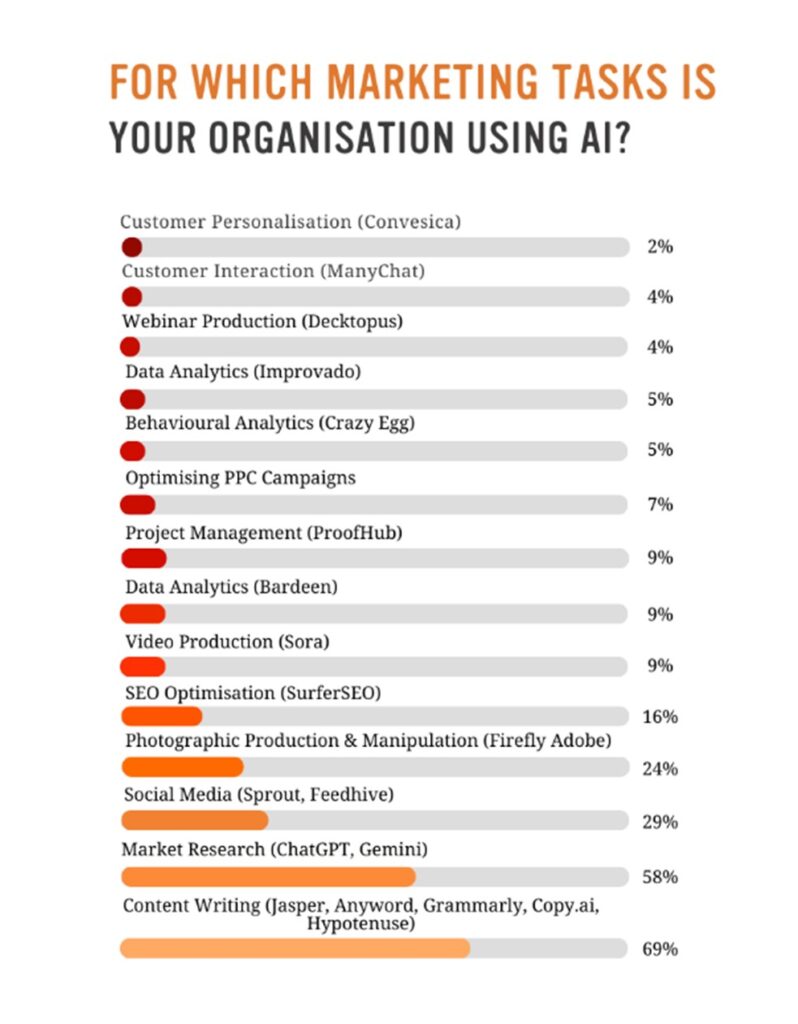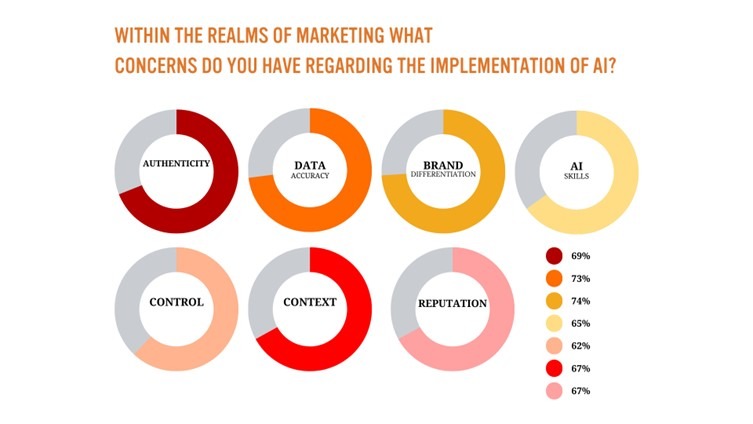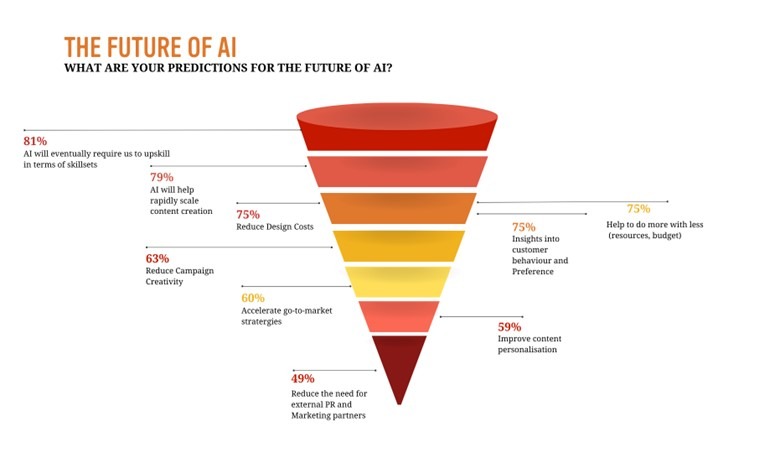SAY has conducted an in-depth study in partnership with BAYES Business School, gauging how actively CMOs are leveraging AI technology to boost workplace productivity & output. By gathering detailed response data from an extensive client network of over 100 marketing executives – & supplementing it with desk research – this report sheds light on the latest trends, challenges & attitudes surrounding AI usage in marketing.
Adapt or Die: Striking the Right Balance
As AI adoption rapidly increases, our study confirms that CMOs are assessing the strategic adaptations needed to survive & thrive as part of an AI-centric landscape. With AI taking over traditional marketing tasks & providing boundless scope for innovation, many are conscious of an overreliance on tech that lacks sufficient human intervention, personalisation & brand identity. They worry that failing to strike the right balance may well undermine a brand’s authenticity & individualism. In our study we outline key findings & future projections surrounding the transformative potential of AI.
AI Adoption Among CMOs: How Widespread is it?
In one word, very. When asked if AI tools were being used within marketing divisions, 93% of respondents answered in the affirmative. However, whilst 81% of respondents claim to use AI tools ad-hoc, our survey found that only 12% have fully incorporated AI into their marketing strategies. A small portion of respondents (3%) even claimed to have an organisational restriction policy against the use of AI for reasons including regulatory concerns, security, ethical considerations, or organisational structure.

Responses to this question suggest that the majority of CMOs are utilising AI tools to some extent within their marketing activities, evidencing an increasingly widespread acceptance & adoption of AI technology. Despite prevalent use of AI in the marketing domain, with many employing AI technologies on an ad-hoc basis & others restricting access entirely, companies may benefit from further exploration & analysis of AI adoption. Considering how they might transition from ad-hoc usage of AI to more integrated & strategic implementations, CMOs must also acknowledge any organisational barriers or concerns surrounding the approval of AI tools.
The Rise of AI: How’s it Being Embraced?
69% of respondents report using AI tools for content writing and 58% for marketing research, making these the marketing tasks most likely to have already been disrupted by AI. What these headline figures don’t tell us is the extent to which they are being used. For example, whether it is to support higher quality more consistent human output, or whether a significant number are delegating these tasks entirely to machines.
In our view the latter scenario is deeply problematic as it would inevitably lead to outputs lacking in the authenticity, credibility and human touch that makes prospects want to engage. It would threaten to strip brands of their very identity if everybody and their competitors began to sound exactly the same. Whereas the former can be celebrated as a means of empowering skilled individual to be more productive, recognising the value they bring through nous, knowledge and expertise.
Of further note 29% are using AI for social media & 24% for photographic production & manipulation. Further responses are detailed in the graphic below:

According to the above data, AI is being utilised across a range of marketing tasks & processes, with emerging trends suggesting a focus towards enhanced efficiency, effectiveness, & automated insight generation in marketing operations.
AI’s Marketing Dilemma: Major Concerns Uncovered
The CMOs surveyed raised numerous major concerns regarding the adoption of AI within the realms of marketing. Collectively these were authenticity (69%), data accuracy (73%), & brand differentiation (74%). We found this contradictory bearing in mind 69% are using AI for content creation.
Concerns surrounding AI skills (65%), control (62%), context (67%), & reputation (67%) were also shared among CMOs considering AI adoption. This reflects a level of apprehension within organisations that doubt the capacity of their existing tech stack & the AI preparedness of their current workforce. Unclear governance over AI-driven marketing initiatives & of how unsupervised output might diminish the credibility of a business are also conceivable realities that trouble CMOs.

Future Forecast: CMOs on AI’s Marketing Impact
CMOs appear to be in agreement when considering the future of AI in marketing. The possibilities of AI to rapidly scale content creation (77%), reduce design costs (77%), improve the overall efficiency of resources (76%) were consistent across the sample. In terms of what this means for industry professionals, a large proportion of respondents (83%) believe AI adoption will eventually necessitate upskilling in terms of skillsets in the marketing domain.

While predictions for the future of AI in marketing acknowledge a general belief in the continued longevity & innovative capabilities of the technology to optimise output & insight, there is clearly an awareness of potential challenges & the need for ongoing skill development if AI’s full capabilities are to be harnessed.
As an integrated communications agency serving the B2B tech industry, SAY is dedicated to supporting the ambitions of tech brands looking to navigate the challenges & opportunities afforded by AI integration.
In examining how active CMOs approach AI usage & grapple with ongoing concerns surrounding the eventual impact of diluted comms, SAY’s senior marketers are well positioned to help such organisations navigate & leverage for good, this new & evolving technology landscape.
In Conclusion
From the survey conducted it is evident that a systemic, deliberate approach to AI is critical. A clear AI roadmap needs mapping to allow for a greater percentage of CMOs adopting AI on a fully integrated basis.
Furthermore, it is apparent that investment is needed for the development of AI skills & by not doing so will clearly hinder any form of digital transformation. Lastly, organisations must prioritise ethical use of AI. Due to evident levels of concern regarding authenticity & data accuracy, we endorse the acknowledgment of ethical AI practices.

